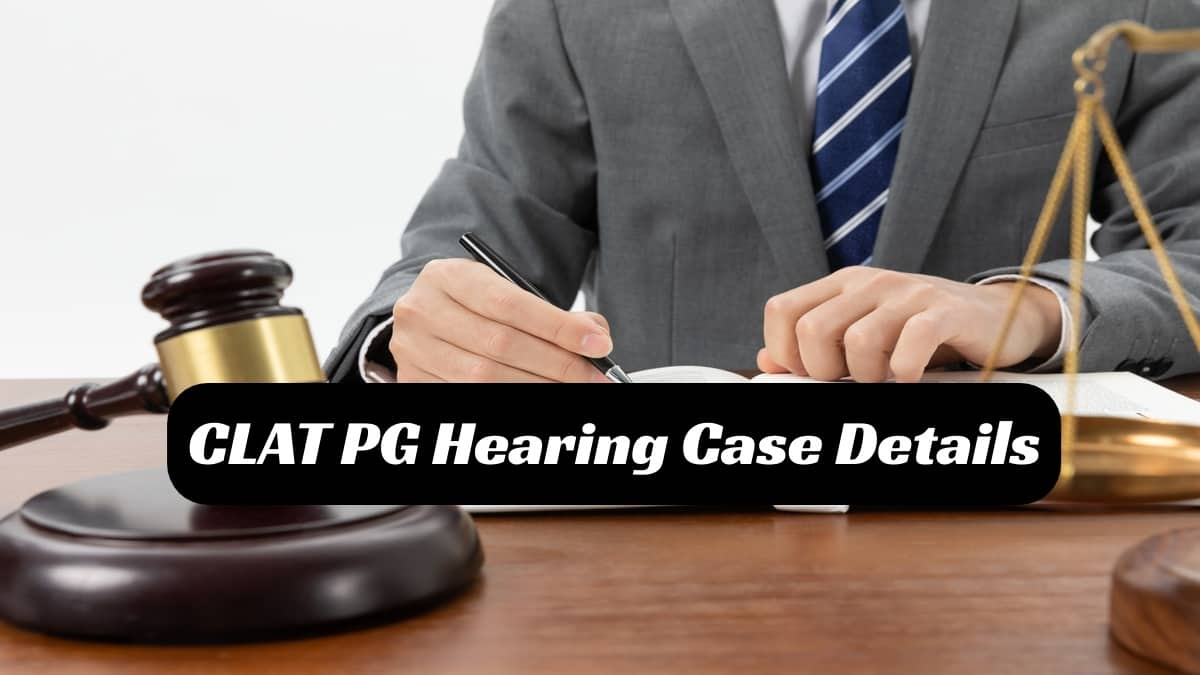CLAT Legal Reasoning Mock Tests
Free Ebook - CLAT 2025 legal reasoning questions with detailed solutions
The Delhi High Court conducted the CLAT PG hearing on May 27, 2025. The cases in CLAT PG were heard by a Division Bench of Chief Justice Devendra Kumar Upadhyaya and Justice Tushar Rao Gedela. After hearing the matters, the HC reserved the verdict. The judgement will be delivered in the matter of three questions, namely Q. 21, 57, and 98 from the master booklet. Other than mistakes in the CLAT PG answer key, the petitioners also questioned the high cost of raising objections, which at present is Rs 1000 per objection. It remains to be seen whether the CLAT PG result 2025 will be revised. In this article, get all details of the CLAT PG High Court hearing that ended on May 27.

Petitions were filed by three candidates. The questions were common for petitioners Anam Khan and Ayush Agrawal. While petitioner Nitika had two questions, one of which was a common question with the other petitioners.
The cases primarily pertain to mistakes in the answer key. Initially, a total of 8 questions were challenged. However, the Consortium of NLUs, after holding meetings with the candidates, decided to voluntarily withdraw 4 questions. Of the remaining 4 questions that came up in the CLAT PG hearing on May 27, the challenge to one of the questions was withdrawn by the petitioner’s counsel. The remaining three questions are given in the table below.
Free Ebook - CLAT 2025 legal reasoning questions with detailed solutions
The petitioners’ counsels also object to the Rs 1000 per objection fees, which they deem to be too high.
Q no in Master Booklet | Details | Answer as per the Consortium | Answer as per the Candidate |
21 | Question on passage based on the nature of employment/ industry | B | C |
57 | Question on passage based on GST | A | B & D |
98 | Question on passage based on rights and duties | A |
Sl. no. | Parties | Case No. |
1 | Anam Khan Vs Consortium of NLUs | W.P.(C)-2364/2025 WITH LPA 1251/2024 LPA 1250/2024 W.P.(C) 2558/2025 W.P.(C) 2560/2025 W.P.(C) 3369/2025 |
1 | Nitika Vs Consortium of NLUs | W.P.(C) 2558 /2025 |
3 | Ayush Agrawal Vs Consortium of NLUs | W.P.(C)-2560/2025 WITH LPA 1251/2025 LPA 1250/2024 |
Other than the cases in CLAT PG, the high court also took up a case about CLAT UG, where the candidate alleges she was not allowed to underline paragraphs in the question paper that affected her performance in the exam. The case will now be listed in July 2025.
On Question asked by student community
Hello there,
Having a 15000 general rank and 1740 as your SC category rank, your chances of securing a seat are very low. As per the previous trends, it is a direct no for you to get into the top-tier NLUs since the closing general rank is around 1500-3000. If
With a CLAT PG rank of 1257 in the SC category and being a woman candidate with Rajasthan domicile, you do have a realistic chance of securing admission to several National Law Universities, though the top NLUs may be difficult at this rank. Admission chances depend heavily on category-wise cut-offs,
With a CLAT PG rank of around 11,000, getting admission into the top National Law Universities (NLUs) is not likely, as their general category cut-offs usually close much earlier. However, you still have realistic chances in lower-ranked and newer NLUs, especially in the later rounds of CLAT counselling or through
Hello,
Here is your CLAT 2026 Rank-Wise College List - Available NLUs in your rank range. I am providing you the link. Kindly open and check it out.
https://law.careers360.com/articles/clat-2026-rank-wise-college-list
I hope it will help you. For any further query please let me know.
Thank you.
The clat pg 2025 first allotment list for tamil nadu national law university (tnnlu), tiruchirappalli, was officially released on may 26, 2025. according to the first round seat allotment results for the pg (llm) program, the all india closing rank for the general category at nlu trichy was 1,290. for
Among top 100 Universities Globally in the Times Higher Education (THE) Interdisciplinary Science Rankings 2026
NAAC A++ Accredited | Ranked #11 by NIRF
NAAC A+ Accredited | Among top 2% Universities Globally (QS World University Rankings 2026)
Merit Based Scholarships Available
Register for Judiciary Exam Preparation from TopRankers.
VIT Chennai LLM Admissions Open 2026 | #1st in Private Law Institute by IIRF Ranking | Experienced Faculty | World Class Infrastructure